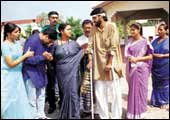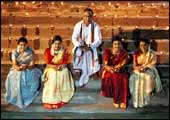|

|
|
Radaan's
R. Radikaa: South
India's queen of soaps
|
|
|
Life
comes to a standstill in most households in Tamil Nadu at 9.30 p.m.
For the next 30 minutes, everyone sets their insignificant little
problems aside and catches up with the life of Annaamalai, a wronged
single mother of four who, through sheer dint of industry becomes
the publisher of an investigative publication, and with the lives
of others (their number is not inconsiderable) out to ruin her.
The eponymously titled soap has been aired on Sun TV, one of the
most profitable television channels in India, since October 2002.
And it will likely coast through one more year with television rating
points (TRPs) in the 20-27 region.
In one of life's delightful little coincidences,
Annaamalai, is produced by Radaan Mediaworks, founded by R. Radikaa,
an actress with some 300 motion pictures-she was the leading lady
in most-behind her. The idea for Radaan came to Radikaa in 1994,
when she was a single mother herself. "I didn't want to travel
around doing roles in films I wasn't really interested in; I wanted
to be with my daughter." And so, she decided to get into television.
The early years were forgettable; Radaan did
nothing much of note. Radikaa was back in the movies and as Anil
Mishra, coo, Airtime Sales and Syndication, UTV (one of Radaan's
marketing partners) points out, "A creative person can contribute
by way of expertise and talent, but this is quite different from
the nuts and bolts of running a company." By 1997, Radikaa
realised this. She sent an SOS to her brother M.R. Mohan Ratha,
who had settled down in Sri Lanka.
Today, Ratha is the company's Managing Director,
Radikaa, its Chairman and Creative Director, and Radaan is a profitable
company with revenues of Rs 25 crore and earnings of Rs 1 crore
(in 2002-03).
|

|
|
Women
rule : Mega-serial
Chithi bestowed Radaan with creative respectability
and taught it a winning formula
|
Ratha-BT couldn't meet the media-shy managing
director because he was travelling-hired a professional CFO, who
later became Director Finance (D. Ravichander Babu, a management
consultant in an earlier life), adopted modern hr practices, and
generally cleaned the place up. Radaan's first big break came in
2000. That was the year Kaun Banega Crorepati rewrote the rules
of television programming. Radaan pitched a similar show in Tamil
to Sun TV. The channel's CEO Kalanidhi Maran wasn't interested.
But when rumours that Star's Tamil channel Star Vijay was launching
a similar show hosted by Kamal Hassan surfaced, Maran turned around
and signed up Radaan.
The gameshow, Koteeswaran, hosted by Kollywood
Sharath Kumar, turned things around for Radaan (and Kumar went on
to become Radikaa's third husband in 2001). From Rs 4 crore, its
revenues zoomed to Rs 16 crore. "But a Rs 4-crore company had
to first face the challenge of raising Rs 2 crore required to produce
the show," laughs Babu. Koteeswaran may have catalysed the
coming of age of Radaan, but it was another serial, Chithi, which
the company launched in 1999 that set the stage for its popular
and commercial success.
488 Reasons Why
For two years and 488 episodes, Chithi (Tamil
for stepmother) dominated the Tamil soap market. Much like Balaji
Telefilms' Ekta Kapoor, Radikaa-the two share another common interest,
numerology, which explains the peculiar spelling of Radikaa's name
and Kapoor's K obsession-discovered the secret of great soaps around
that time: strong women. "Radikaa and I agree that women are
the prime generators of trps for serials," explains C.J. Baskar,
the Scriptwriter and Director of Annaamalai (he also directed Chithi).
Even the antagonists in the soap are strong women. Today, the majority
of the company's 10 soaps showing across three channels in South
India follow this formula.
|

|
|
Not
little women: Radaan's
Rajugari Koothurlu, now being aired on Telugu channel
Gemini, is a tale of four sisters
|
Still, while a plot revolving around strong
women can guarantee audiences-every week Radaan reaches some 9 million
viewers, the bulk of them women, through its soaps-it can't, profits.
Chithi, admits Babu, was not as outstanding a commercial success
as its popular success makes it out to be. "It only made marginal
profits; I signed on with Radaan after half of the serial was over
and went about rewriting contracts with people; we even went to
court."
Still, Chithi gave Radaan the creative respectability
all production houses crave for, and it taught the company several
valuable lessons about the making of serials. Babu rattles these
off.
One, focus on costs. "Sometimes, when
a director says he needs to spend lavishly on a wedding scene I
tell him that such a thing can only hurt the company; maybe our
TRPs will go up marginally for a day or two, but they'll soon settle
down again." Two, pay actors only through cheques, and after
deducting tax at source. The February 2003 IPO helped the company
retire its high-cost debt. There are more in the same vein, but
surely, you get the picture.
Make That 489
The most important reason for Radaan's success
is its business model. Unlike most other television production companies,
Radaan buys time-slots from channels and markets its soaps to advertisers
through marketing partners (such as UTV).
This has helped the company retain the rights
to its shows, and market them in other Asian markets. And a market
exists: the (pirated) video release of Chithi, for instance, was
a success of sorts in South Africa, a country with a sizeable proportion
of Tamil speakers.
|

|
|
True
lives : Radikaa
(left) on the sets of Annaamalai
|
The company has also worked at acquiring a footprint
outside India: it is co-producing a Sinhalese soap for the Sri Lankan
market, a Malay and Tamil bilingual for the Malaysian market (it
is also working out the details for a Malaysian version of Koteeswaran),
and supplies software to Dheepam, a UK channel that caters to the
Tamil population in that country. By early November, claims Babu,
Radaan will announce its plans for the national market; its earlier
attempt to do so, through a dubbed version of Chithi on Zee came
a cropper.
With its share trading at a modest Rs 53 (a
fact that will push it down the rankings some next year), Radaan
hopes to close 2002-04 with revenues of Rs 35 crore and earnings
of Rs 3.5 crore.
Its attempt to create big-screen magic could
help its cause, but it could also derail its growth strategy. Its
last full-length motion picture, Dhum (in Telegu) bombed at the
box office. Undeterred, the company has announced two more motion
pics, one each in Telegu and Tamil. Each of these could set the
company back by Rs 3-4 crore, and Radaan, according to Babu, "will
get into big budget movies too".
For her part, Radikaa is clear that Radaan's
ultimate objective is Hollywood. "We want to be a global player,"
she says. As Annaamalai regulars well know, anything is possible
in Radaan's world.
|
